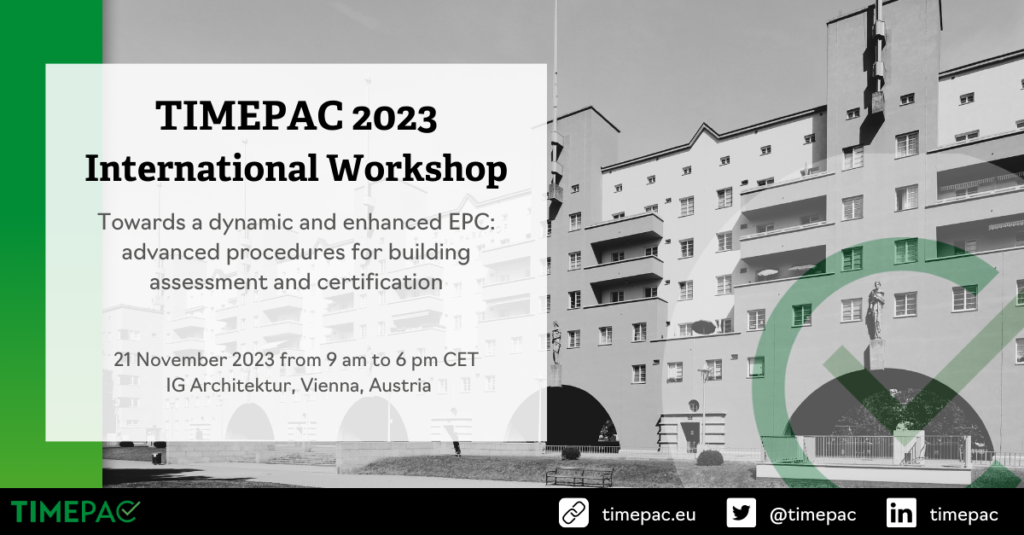TIMEPAC-2023
Towards a dynamic and enhanced EPC: advanced procedures for building assessment and certification
Table of Contents
Start: November 21, 2023 9:00 am
End: November 21, 2023 6:00 pm
Chair: Susanne Geissler, SERA global GmbH, TIMEPAC partner, Vienna, Austria
Join building energy efficiency experts in Vienna for the 2023 edition of the TIMEPAC International Workshop to learn about the latest developments in energy performance certification.
Renovating Europe’s building stock is essential to help achieve a higher degree of energy efficiency and meet Europe’s clime goals. Enhancing energy performance certification is crucial in driving this renovation.
The TIMEPAC 2023 workshop offers researchers and professionals involved in the energy efficiency and assessment of buildings, the opportunity to share insights and outcomes regarding the anticipated changes in the energy performance certification within the context of the ongoing recast of the Energy Performance of Buildings Directive (EPBD).
It is also an excellent occasion to learn about the initial outcomes of the TIMEPAC project – now at the end of its second year of activity – and explore paths for future collaborations between participants.
We look forward to welcoming representatives from the private sector, public administration, academia, and research who are interested in the ongoing changes in building assessment and retrofitting, aligned with the goals of the European Green Deal.
The workshop is held on-site in English language and is Online accessible for remote audiences via live stream.
The 2023 edition of the TIMEPAC workshop will be structured in four sessions focusing on the following themes:

Using BIM for the EPC generation process
In this session, we will explore the procedures used to obtain data from Building Information Modeling (BIM) for Energy Performance Certification (EPC) generation, while also delving into the benefits of utilizing BIM for creating the EPC.

Integrating data sources in renovation roadmaps
This session explores the benefits of establishing linkages between Energy Performance Certificates (EPCs), energy audits, logbooks, and Building Renovation Passports (BRPs) and how it can impact cost savings and reliable decision-making.

Enhanced EPC - integrating additional indicators, SRI, and BRP
This session will discuss the advantages and challenges of integrating additional sustainability indicators such as IAQs and SRIs.

Supporting the Renovation Wave
In this session, we will aim to identify new approaches to identify and track the implementation of renovation measures, to ensure that decarbonisation the building stock is actually achieved.
Agenda
Tuesday November 21st, 2023
-
8:00 | Registration and technical set-up
SERA team -
9:00 | Opening words
Sylvain Robert, Project Officer, CINEA, European Commission -
9:00 | Welcome and TIMEPAC Vision
Leandro Madrazo, La Salle-URL (FUNITEC)
Session 1: Using BIM for the EPC generation process
Questions addressed, among others:
- Which procedures have you been using to obtain data from BIM for EPC generation?
- Which were the benefits of using BIM to create the EPC?
- Which was the impact on cost and reliability of the resulting EPC?
- What would be required to make the procedures effective in practice?
-
09:30 | Setting the scene: EPC and BIM
Álvaro Sicilia, TIMEPAC -
09:45 | Integration of Open BIM and EPC: lessons learned
Benjamin Gonzalez, CYPE -
10:00 | The open platform of the MODERATE project to enhance building processes
Francesca Conselvan, e-think Energy Research - 10:15 | Panel discussion with presenters and audience: Which challenges remain? What is still needed to solve them? | Moderator: Sabine Sint, TU Wien SIMULTAN
- 10:45 | Coffee break (30 minutes)
Session 2: Integrating data sources in renovation roadmaps
Questions addressed, among others:
- What benefits have you identified from establishing a linkage between, for example, Energy Performance Certificates (EPCs), energy audits, logbooks, and Building Renovation Passports (BRPs)?
- How have you addressed the establishment of such linkages in your activity?
- What is the impact on cost and reliability of information resulting from this interlinking of data/documents?
- What would be needed to make these procedures effective in practice?
-
11:15 | Setting the scene: Making use of data repositories for generating renovation roadmaps
Susanne Geissler, TIMEPAC -
10:30 | The untapped potential of Austrian Energy Performance Certificates going public
Armin Tahirovic, ah3 architects -
11:45 | Benefits and requirements of linking building data sources
Nicole Hartl, Austrian Energy Agency -
12:00 | Integration of EPCs in the Administration databases
Adrián Fernández Fernández, EREN - 12:15 | Panel discussion with presenters and audience: Which challenges remain? What is still needed to solve them? | Moderator: Bettina Sticher, SERA Institute
- 12:45 | Lunch break (60 minutes)
Session 3: Enhanced EPC - integrating additional indicators, SRI, and BRP
Questions addressed, among others:
- Which additional indicators have you identified in your project, and what are the advantages?
- How have you integrated them with the EPC?
- What is the impact on cost and reliability of information of the overall building performance?
- What would be needed to make these procedures effective in practice?
-
13:45 | Setting the scene: Additional indicators, from design to implementation
Boris Sučić, TIMEPAC - 14:00 | SmartLivingEPC: Advanced Energy Performance Assessment towards Smart Living in Building and District Level | Stavros Koltsios, CERTH
- 14:15 | Implementing the SRI in the national context – findings from research projects supporting the Austrian SRI testing phase | Doris Österreicher, University of Natural Resources and Life Sciences, Vienna
-
14:30 | Integrating SRI in an EU project, Smart2B - Online Presentation
Miguel Brito, Energias de Portugal (EDP) - 14:45 | Panel discussion with presenters and audience: Which challenges remain? What is still needed to solve them? | Moderator: Marcus Hummel, e-think Energy Research
- 15:15 | Coffee break (30 minutes)
Session 4: Supporting the Renovation Wave
Questions addressed, among others:
- What impact does the utilization of EPC databases have on the reliability and efficiency of renovation measures?
- How do you utilize EPC databases to develop building renovation plans?
- Which approaches have you identified to track the implementation of renovation measures, to ensure that decarbonisation of the building stock is actually achieved?
- What would be needed to make these procedures effective in practice?
-
15:45 | Setting the scene: Building archetypes for developing municipal renovation plans
Ilaria Ballarini, TIMEPAC -
16:00 | URBAN Transformation COLLECTIVE for urbane conversion on different levels of action
Jutta Wörtl-Gössler, Räume für Menschen Architektur -
16:15 | Implementing Building Renovation Plans through a Holistic Data-Driven Platform
Adirane Calvo, Álvaro Sicilia, Leandro Madrazo, La Salle-URL -
16:30 | From one-time data collection to continuous monitoring
Lukas Kranzl, TU Wien - 16:45 | Panel discussion with presenters and audience: Which challenges remain? What is still needed to solve them? | Moderator: Iná Maia, TU Wien Energy Economics Group
Background
The EU Green Deal and the amended Energy Performance of Buildings Directive (EPBD) have prioritized the urgency of increasing building retrofitting rates. In this context, energy performance certification is expected to play a crucial role in the renovation of the European building stock.
The current Energy Performance Certificates (EPCs) are inexpensive but often suffer from low data quality and a lack of sufficient customization to match the actual building conditions. Additionally, their 10 year validity period means they frequently fail to reflect the current status of the building. Overall, there is room for improvement in terms of market acceptance. There exists a clear trade-off between the cost of issuing a comprehensive and tailored EPC and customers’ willingness to pay for it. Lastly, professional certifiers need training in methods and tools that enable them to deliver accurate and reliable certificates.
Nowadays, there are number of EU research projects which are working to improve existing energy certification processes by moving from single, static certification to more holistic and dynamic approaches. This workshop provides an opportunity to exchange the results of these projects and continue progressing towards more effective building certification processes.
